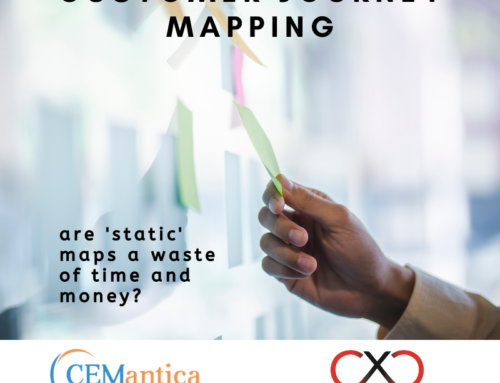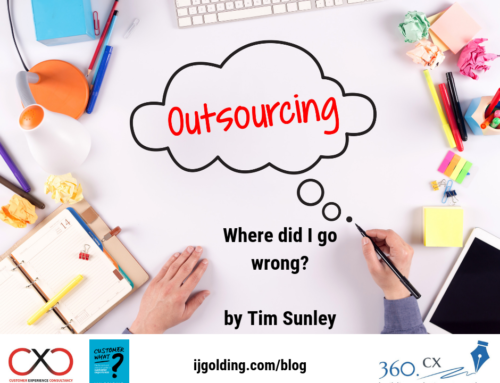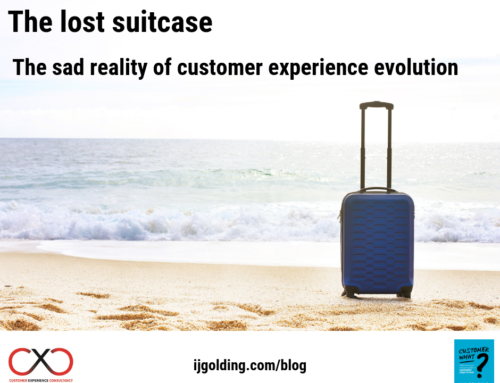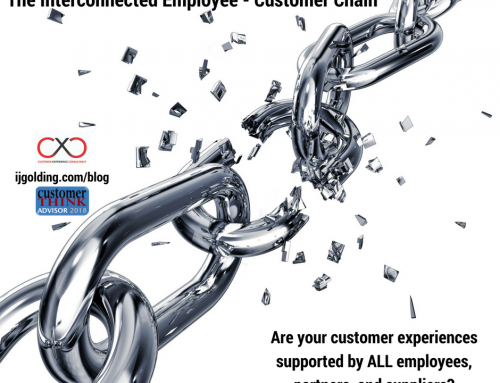
Resentment. It is a pretty harsh word. It is a word that should most certainly NOT be on your mind when thinking about businesses and organisations that you interact with on a regular basis. However, over the last couple of weeks, a number of incidents that I personally have either experienced or read about have made me realise how much resentment is about – and that is why I am writing this now.
Let me start by giving you the formal definition of resentment from Wikipedia:
Resentment (also called ranklement or bitterness) is the experience of a negative emotion (anger or hatred, for instance) felt as a result of a real or imagined wrong done. Etymologically, the word originates from French “ressentir”, re-, intensive prefix, and sentir “to feel”; from the Latin “sentire”. The English word has become synonymous with anger and spite.
‘Anger’……’Spite’……surely the consumer does not feel that way towards an organisation? I feel I may be opening a ‘can of worms’ here, but in a world where businesses are playing up the importance of customer experience, there are still far too many examples of customer/consumer interaction that generate ‘resentment’. I have counselled the trusted people who are in my network to see what they think. They were only too ready and happy to share their examples of ‘resentment’. So let us look at some of these examples:
#1 ‘Paying to Pee’

If you have ever been to London Euston, you will recognise this picture. These barriers are nothing to do with ‘priority boarding’ – they are actually the entrance to the station toilets. At Euston station, for the pleasure of performing a natural bodily function, you must part with 30 pence of your hard-earned money. Going to the toilet is one of the things in life that I absolutely resent having to pay for. Network Rail, who I presume run Euston train station, will probably have a number of reasons why they make consumers ‘pay to pee’. They will probably include the cost of cleaning and maintenance, as well as preventing the toilets from being used for alternative purposes. Whatever the reasons, they are certainly not for the benefit of the consumer (or so it seems). If there is a benefit for me – I would like to know what it is – I may be able to at least understand the need for the charge, rather than having to ‘chunter rude words under my breath’ whilst depositing my coins (so to speak!!).
#2 Paying to ‘drop off’

There was quite a lot of noise in the media last week on the subject of airports charging for passengers to be ‘dropped off’ at the terminal. This interesting article from the Telegraph gives you the essence of the story – http://www.telegraph.co.uk/travel/travelnews/10110505/More-airports-charging-for-kiss-and-drop.html. Essentially at many British Airports it will now cost you a minimum fee JUST to drive up to a terminal, open the door, get out, close the door and drive away – even if that process takes less than a minute. Once again, the airports I am sure will be able to cite a myriad of reasons why this action has had to be taken. However, as I sit here writing this, I do not know what they are. All I do know is that the action will just generate resentment amongst the millions of passengers who will feel it in their pocket.
#3 Paying to park

One of the number 1 causes of resentment is car parking. Paying to park your car inevitably leads to more negative emotion than positive. There is a view that paying to park in the first place is just plain ‘wrong’! When asking my network what they thought causes resentment, Graham Maloney, an ex-colleague of mine from Shop Direct said:
Car parking generally everywhere! Visiting my parents in Spain & not having to pay to park, even by the beach, is refreshing!
David Clark (Gartner) looked at resentment with car parking in a different way:
Preventing motorists from sharing a ticket when they leave a car park early because its coded to their number plate is one of those little actions that everyone thought made sense commercially, but starts any citizen experience in a city with a negative perception. That little emotional high when someone helps someone else makes a difference in the day.
David’s example is a very good one. Resentment can be caused indirectly – essentially anything like this that prevents us (the consumer) from making a decision to do something we were previously able to do has the potential to cause upset. So what about non car parking related examples, or examples that are unrelated to cost or fees?
#4 Not able to try it on
Roger Smith, a fellow avid tweeter resents the following:
M&S formal shirts – can’t try on in store as in packet, buy, drive home, try on. Doesn’t fit, drive back and change. Grrrrrr
Roger’s example is one that creates resentment that could be easily avoided. How easy would it be for a retailer to have a variety of sizes to try on – just to make sure you do not have to experience the frustration of having to bring it back? You can try on shoes, so why not shirts?
#5 Paying for a trolley

Let’s go back to the airport for the next example. The last time I went to Manchester airport was for pleasure – not business. As I was with my family, we had enough luggage with us to justify me getting a trolley. I put my £1 coin in the machine to get the trolley, and manoeuvred my luggage to the check in desk. Having checked in, I took the trolley back to get my £1 coin safely back in my pocket. Can you guess what happened? You no longer get your £1 back!!!!!!! You now have to PAY just to have the pleasure of using a trolley!!!!! If I had known, I would have left it at the check in desk!! I was flabbergasted – I strongly resent the experience, and will never, I repeat never use a trolley at the airport again. My three children will have to start working on their biceps!
This new policy of charging for the use of a trolley was also cited as a an example of a friend of mine, David Hindle (Sennheiser), who is a regular business traveller. It is always nice to know that it is not just me that finds this kind of think infuriating. I found this explanation for trolley charging on the Manchester Airport website – I’ll allow you to draw your own conclusions – http://www.manchesterairport.co.uk/manweb.nsf/Content/trolleys
#6 Paying for Wi-Fi
Oh yes!! I hear you cry. One of the great causes of resentment in the 21st century is being forced to pay to use Wi-Fi. Sarah Povey (Total Gas & Power) and social media guru, Guy Stephens (IBM) both agree that this is not something that makes them smile! Interestingly Premier Inn, a very strong customer focussed brand in the UK recently decided to change their Wi-Fi policy. They had always charged for Wi-Fi, but recognised through their customer feedback mechanisms that this was one of the key drivers of customer dissatisfaction. So Premier Inn decided to ‘listen’ to the customer, and provide free Wi-Fi…………but only for 30 minutes a day! Nice start, but maybe not enough……Why could they not go the full hog and just make it free all the times?

#7 Repeating and re-repeating information
This will have happened to you. You have finally selected the right option on the automated phone system…..you have told the computer your name, account number etc…….listened to the lovely musak………..only to get through to an agent who asks you to say your name and account number all over again! Chris Cunningham (Lithium Technologies) explains it much better than me:
‘spending several minutes telling an automated IVR my inside leg measurement, credit card number, my mother’s maiden name and my blood group, to only be asked all the same questions AGAIN when I get to talk to a human…..’
Do we agree that this is indeed annoying to the point of resentment?
#8 Waiting and paying in restaurants

What about the restaurant experience? Richard Piatkowski (Interactive Intelligence) resents ‘having to ask more than once for the bill, and then even worse, having to wait to actually pay it’. This has happened to me and is hugely annoying. And do not get us started on the ‘mandatory service charge’ for parties of 8 or more – something that Nick Govier (NG Interiors) finds irritating – especially if you are ‘crammed around a table that would normally seat 6!’
I could go on and on and on – I have not even included the old chestnut of having to pay to get money out of a cash machine – an irritation brought to my attention by Samantha Lee from Percepta – I must admit, being made to pay to get your hands on your own money does take the biscuit!! I am hoping by now that you get the gist! Organisations do too many things that create resentment. In an environment where the consumer has no choice, it is difficult to influence change. However, if you are an organisation that interacts with customers who DO have a choice, you would be well advised to take heed of some of the examples detailed above. Once you start to resent a company, it is very hard to get you to think differently. To stop this from happening, make sure you understand your customer journey, and the way your customer feels about the journey ‘end to end’. If you need to change something due to operational or cost constraints, make sure you understand the IMPLICATIONS of the change on your customer. How will it make them feel? If it will make them resent you, maybe you need to think again!
What examples of resentment do you have? I would love to hear them.






Re charging for station loo – they are much better than they used to be and according to someone I asked they said drug addicts no longer go use them for shooting up. I always try and use the train loo before I arrive! Ian, you could of course take the newspaper with you and stay inside until you’ve had your ‘value for money’. Or even write a ‘Bog Blog’ on your iPad!
A ‘bog blog’ – now that’s a thought!! I have to say, I did use the toilets last week – not only were they not very clean, but three of the four hand dryers were ‘out of order’. For thirty pence a pop (or poop), I expect the toilets to be sparkling – sadly they were not, which makes me resent paying to use the toilet even more!!
Another cracking blog. Hmmm – as ever, Ian, you’ve got me thinking. I’m going to put together a blog around resentment caused by customer communication. The old favourite “price change” letter, for example. Thanks!
You are too kind Mark! I just received a letter like that from my Bank – they have not once contacted me in my two years as a business customer to find out if everything is ok with me. The first communication I received was telling me that I now had to pay for a variety of services. I very much look forward to your post!!